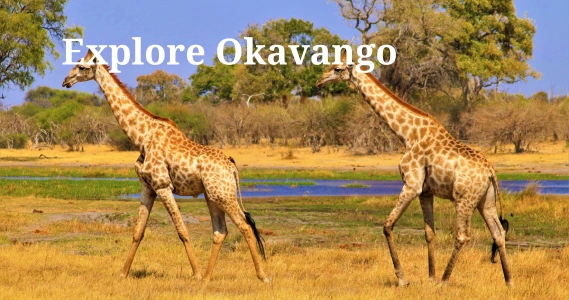Book Your Dream Flight with Flightd
Home » Flights
There are wild places in the world, and then there’s the Okavango Delta, a place that feels almost untouched by time. Tucked into the heart of northern Botswana, this vast inland delta doesn’t just invite you in — it swallows you whole

It’s not just the beauty that stuns you here; it’s the silence, the stillness, and the way life pulses beneath the surface in ways you don’t see at first — but you feel it . With Flightd, planning your journey to this remote wonder is easier than ever, helping you find the best flights to Botswana so you can step into the wild with confidence..
It’s hard to imagine how an oasis like this exists in the middle of a desert. But each year, long after the rains fall in distant Angola, the floodwaters slowly make their way down into the Kalahari sands — turning dry earth into a shimmering patchwork of rivers, islands, and wetlands. Suddenly, what was once golden and still bursts into vibrant green. Animals arrive. Birds fill the air. The Delta wakes up.And you do, too.
Wild in Every Sense of the Word
Out here, you're not just watching wildlife. You’re part of it. Elephants walk through the water right past your camp. Hippos grunt through the night. You see the ripple of a lion moving through tall grasses, no fences, no barriers, just you and the wild, as it’s meant to be. Every game drive, every mokoro canoe ride, every quiet walk with a guide feels electric. Not because it’s dangerous but because it’s real.
Floating Through a Living Dream
One of the most peaceful ways to explore the Delta is by mokoro, a traditional dugout canoe. It’s silent except for the sound of water sliding past the hull and the occasional bird call echoing overhead. You glide through lily pads, tall reeds brushing your shoulders, dragonflies flitting by. There’s something meditative about moving so slowly, so gently, through this world. You’re not disturbing anything, you're simply witnessing it.
Nights Under a Million Stars
When the sun sinks and the colors melt across the sky, you settle into your tented camp, maybe with a glass of wine, maybe just listening to the bush come alive. Lions call in the distance. Hyenas laugh. The fire crackles. It’s the kind of night that makes you feel small in the best way. Far from roads, screens, and noise, you’re reminded of something primal, something true. That we’re part of this world, not separate from it.
The Okavango Delta isn’t flashy. It doesn’t try to impress you. It just is. Honest. Raw. Alive. And that’s what makes it unforgettable. It reminds you that there are still wild places on Earth — places that haven’t been tamed, where nature still moves to its own rhythm. And once you’ve been here, the noise of modern life seems a little quieter. Your breath comes a little slower. You carry the Delta with you — long after you’ve left its waters behind.
Q1.What is the best time to visit the Okavango Delta?
The most popular time to visit is during the dry season, from June to October, when wildlife is most concentrated around the water sources and the annual flood has filled the Delta. That said, the green season (November to April) offers lush scenery, fewer tourists, and excellent birdwatching.
Q2.How do I get to the Okavango Delta?
Most travelers fly into Maun, the gateway town to the Delta. From there, you can take a small charter flight directly into a safari camp or lodge within the Delta. Some camps are also accessible by 4x4 vehicles or boat, depending on the season and location.
Q3.Is the Okavango Delta safe to visit?
Yes, it’s generally very safe — especially when visiting with licensed guides and staying in reputable lodges or camps. Like any wilderness area, respect for the environment and wildlife is key. Follow your guide’s instructions, and you’ll have a safe and unforgettable experience.
Q4.What animals can I expect to see in the Delta?
The Okavango Delta is home to an incredible variety of wildlife, including elephants, lions, leopards, buffalo, hippos, crocodiles, and African wild dogs. It’s also one of the best birding destinations in Africa, with over 400 bird species recorded.
Q5.Can I go on a safari by boat or canoe?
Absolutely! One of the Delta’s most unique experiences is exploring by mokoro — a traditional canoe guided through the floodplains. You can also take motorboat safaris in deeper channels. These water-based safaris offer a different and peaceful way to see the ecosystem up close
.
Q6.What kind of accommodations are available in the Okavango Delta?
There’s something for every type of traveler, from luxury tented camps with five-star service to eco-lodges that focus on sustainability and remote bush experiences. Many offer all-inclusive packages with guided activities, meals, and scenic charter flights.
Q7.Do I need a visa to travel to Botswana?
It depends on your nationality. Many visitors, including those from the US, UK, EU, Canada, and Australia, do not need a visa for stays of up to 90 days. However, it’s always a good idea to check with your local embassy or Botswana’s official immigration site before traveling.
Conclusion:
The Okavango Delta is one of the only inland deltas in the world that doesn’t drain into the ocean — instead, the water spreads out across the Kalahari Desert, creating a lush, seasonal wetland in the middle of an otherwise arid region. This rare geography supports a thriving and dynamic ecosystem, making it one of Africa’s top safari destinations With Flightd, you can easily find the best flight options to Botswana and start planning your journey into one of the most extraordinary natural wonders on Earth.
Read More:- Click Here